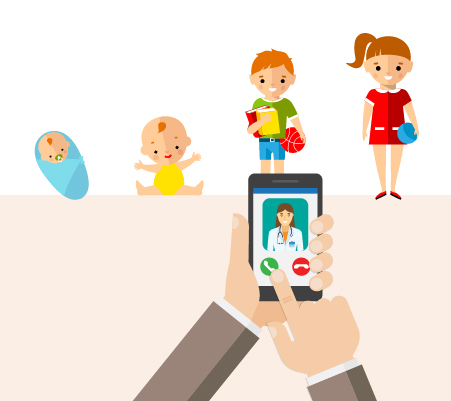A cold, stomach virus, fever and rash are unpleasant for kids and nerve-wracking for parents, especially if it’s the first time your baby has been sick.

These tips will help you decide when to call the pediatrician and keep your child comfortable if it’s not time to see the doctor.
How early is too early to call the doctor?
Illnesses in babies younger than 2 months usually require a pediatrician visit.
“Newborns haven’t received vaccinations,” said Chris Russell, physician assistant with Marshfield Clinic Health System. “They aren’t able to fight infections very well. Minor symptoms can quickly become serious.”
You can usually wait longer before bringing older kids to the doctor because their immune systems are more developed.
Bringing older children to the doctor at the first signs of fever, cough, rash, vomiting or diarrhea usually ends in advice to monitor their symptoms. Families can avoid extra medical visits by waiting a few days to see if symptoms improve before making an appointment.
“Sometimes parents think a diagnosis was missed at the first appointment when symptoms weren’t present at all or long enough to diagnose the illness,” Russell said.
Pay attention to how your child looks and acts before calling the doctor. If he is still eating and playing, it’s fine to continue monitoring at home. Call the pediatrician if your child is lethargic, has trouble breathing or doesn’t look well.
Download this chart to help you make the call on bringing your sick child to the doctor.
Download or print chart
If you need an appointment that day, you can visit a walk-in clinic and urgent care or some pediatricians offer same-day appointments. Call your doctor for more information about their same-day appointment availability.
Treat sick symptoms at home
You can help your child feel better at home if symptoms aren’t serious enough to see a doctor.
Baby or child with fever
- Give children 2 years or older children’s ibuprofen or Tylenol. Russell prefers ibuprofen for fevers over 102 degrees F. He doesn’t recommend alternating the medications unless using only one doesn’t bring the fever down. Closely track how often the child is getting medication and who is giving it to prevent accidental overdose.
- Give cold liquids like popsicles or Pedialyte.
- Bathe children in lukewarm water.
Cough/cold
- Keep your child’s head elevated during sleep. Wedge a pillow under the crib mattress for babies.
- Use a humidifier or let your child sit in a steamy bathroom to loosen congestion.
Vomiting/diarrhea
- Give small amounts of fluid with electrolytes every 30-60 minutes. Too much fluid at once may cause vomiting.
- Don’t give antidiarrheal medication. It prolongs the illness.
Rash
- Apply hydrocortisone cream twice a day for itchiness.
When in doubt, call the doctor
“Parents are around their kids all the time, so if they’re worried, I’m worried,” Russell said. “It’s best to call or come in if you’re concerned.”
Providers can reassure parents over the phone that their child is okay and give advice for treating symptoms if an appointment isn’t needed.
Related Shine365 articles
Navigating care for your child
How to choose a pediatrician for your child
Thermometer basics: Which type is best for your child?






Leave a Reply